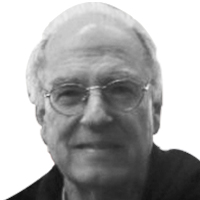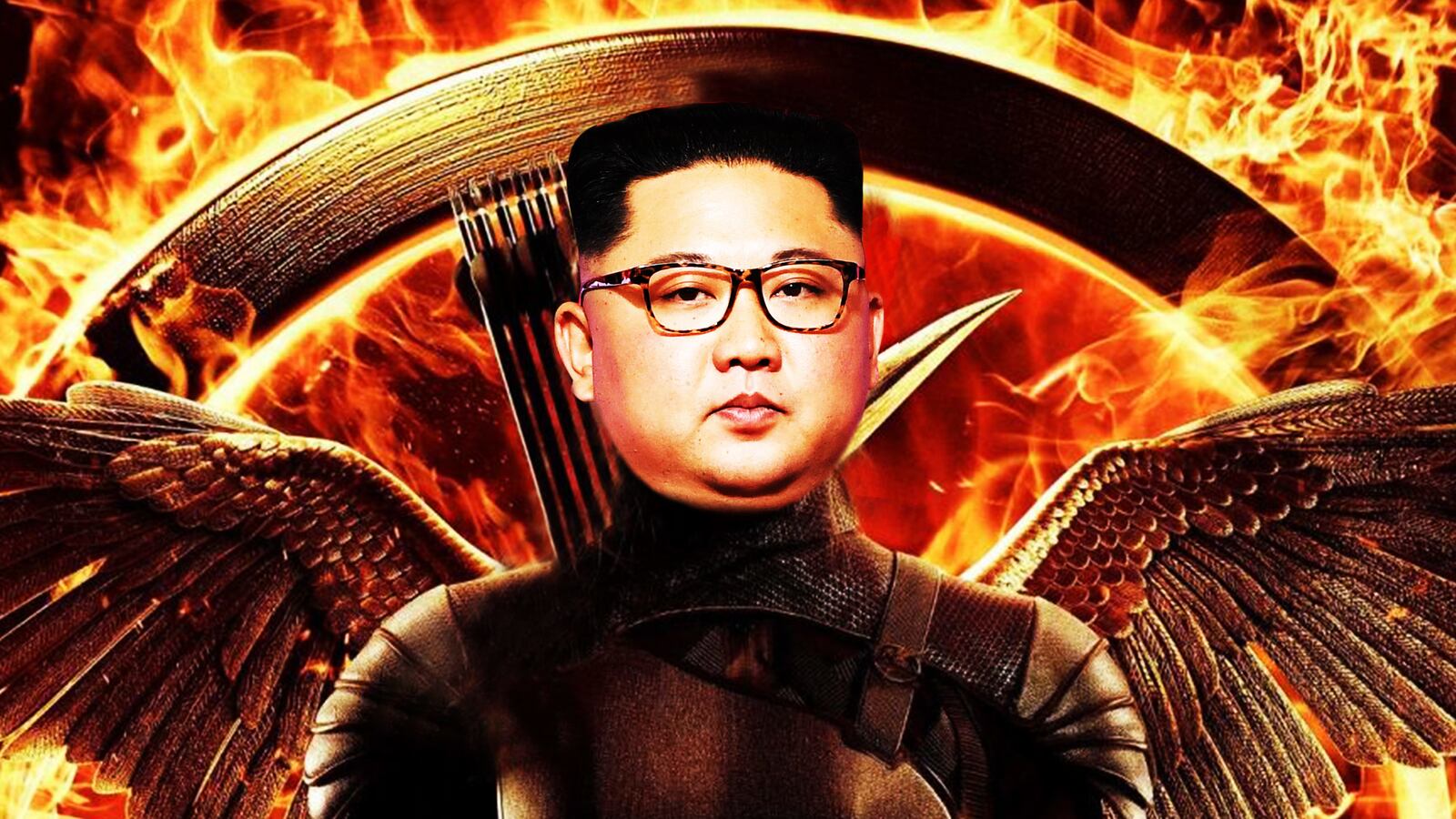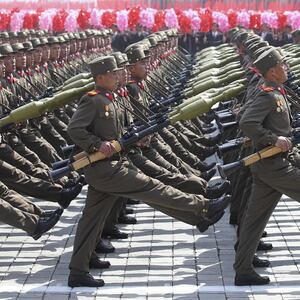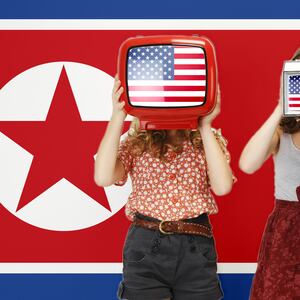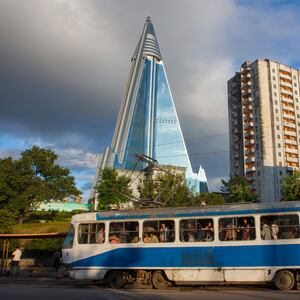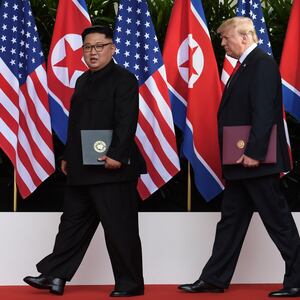SEOUL—After the fall of the Berlin Wall in 1989, which marked the beginning of the end of communist rule in Eastern Europe and presaged the collapse of the Soviet Empire, North Korean dictator Kim Il Sung was no doubt alarmed.
There was, for sure, deep concern among the ruling elite in Pyongyang that the growing prosperity of South Korea would have the same gravitational pull that West Germany and the West in general had exerted on the Iron Curtain.
But Kim Il Sung, who ruled from 1948 to his death in 1994 and remains “Eternal President of the Democratic People’s Republic of Korea,” had a message for his subjects. Weeks after the wall in Berlin came down (which very few knew about to begin with), he told them a massive new concrete wall had just been built by the South Koreans to keep the peninsula divided.
There was, as everyone knew, the heavily guarded demilitarized zone dating to the armistice of 1953, but Kim Il Sung was talking about a huge physical wall, imposing and medieval. For at least two decades, long after the eternal president’s death, references to that imaginary barrier were repeated and its existence reviled in North Korean propaganda.
Ultimately, the point was to build an impregnable wall in the minds of the North Korean people.
Today, the division remains, and it is not only made of razor-wire barriers at the DMZ or the imaginary concrete structure conjured by Kim Il Sung. It is a wall built of hunger.
Kim Jong Un, the grandson of Kim Il Sung, understands all this perfectly well, which is one reason he may be impervious to the promises of U.S. President Donald Trump, who talks about the development potential of North Korea as if he were selling timeshares in Florida real estate.
People tend to think less about getting rich, and less still about the abstractions of democracy and political freedom, when they are struggling to find something to eat.
“In the rural areas it’s about trying to feed yourself day by day,” says Teodora Gyupchanova, researcher with the Database Center for North Korean Human Rights, tracking what’s going on there. “It’s about survival.”
Hunger, she says, is one big reason why most North Koreans outside the elite in the capital of Pyongyang have no notion of life in South Korea—and neither energy nor inclination to defy a system that controls all North Koreans down to the village and family level.
The use of food as a weapon is key, as Robert Collins makes clear in his book, Marked for Life: Songbun, North Korea’s Social Classification System (PDF). Everyone is formally classified depending on family background. Food distribution, like access to a decent job and education, is a privilege from birth.
“The higher the songbun, the better you’re fed,” says Collins. “If you’re on the outside, you’re deprioritized.”
Just to show how pervasive is Kim Jong Un’s power, virtually 100 percent of North Korea’s eligible voters, all those 17 and above, cast their ballots Sunday for five-year terms for members of the Supreme People’s Assembly, the country’s rubber-stamp parliament.
There was no doubt as to what the elections for a single candidate from each of nearly 700 districts were all about. They “strikingly manifest the fixed will of our people to firmly trust and uphold to the last Supreme Leader Kim Jong Un despite storm and stress,” editorialized Rodong Sinmun, the party newspaper.
Thae Yong Ho, the second-ranking diplomat in the North’s embassy in London when he defected with his wife and two sons nearly three years ago, has said in talks here that Americans and South Koreans should get through to the North via personal relationships. Thae, the most prominent defector in South Korea, argues that individual contacts will get the regime to come to terms with the U.S. and South Korea on its nuclear and missile program.
Reports of ongoing hunger and repression of North Koreans, however, tend to discredit that hopeful view. So harsh is Kim’s regime, according to just about everyone who’s examined its system, that efforts at influencing relations with North Korea through personal contacts are not only futile but too absurd to consider seriously.
Thae “thinks it’s important to connect with those in the North early for the purpose of changing things for the better,” says Collins, author of three books reflecting his interviews with nearly 150 defectors from North Korea. “The problem is that he is fomenting rebellion that will result in the deaths of tens of thousands.”
Those who have worked in North Korea for non-governmental organizations get the impression that North Koreans basically have no idea how to respond to reports that South Koreans are leading better lives.
“Many, not most, are aware there is something extra to life in the South” says Collins, “but they cannot understand how to make it happen in the North.” Beyond the elite, “they know nothing of West Germany or East Europe’s collapse.” As for tearing down the demilitarized zone, “Forget about bringing down any wall.”
Central to Kim’s grip is the Workers’ Party, of which he is chairman. As Collins sees it, “The surveillance, political, ideological and physical, by the party and the internal security services is too great” and “the rate of successful suppression keeps population numbers limited.”
Ken Eom, who defected to the South 10 years ago, describes the system that holds the people in check–the national security apparatus, the Workers’ Party and government agencies. “People cannot rise against the government,” he says. Just to be sure, “the government blocks all outsider information. There is no internet, no international calls.” The 5 to 7 million mobile phones carried by North Koreans are capable only of domestic calls.
Kim Jong Un’s stubborn opposition to softening of tensions that might lead to removal of the DMZ helps explain the North’s descent into hardship and hunger. The United Nations coordinator in North Korea, Tapan Mishra, estimates 11 million people—43 percent of the population—“lack sufficient nutritious food, clean drinking water or access to basic services like health and sanitation.”
Eom, who served 10 years in the North Korean army before escaping to China and then via Thailand to South Korea, says “the public distribution system does not exist any more except in Pyongyang.” Roadside markets and stores, existing illegally or in a grey zone in which payoffs are needed to stay in business, proliferate.
Signe Poulsen, Korea representative of the U.N. High Commissioner for Human Rights, says it’s “hard to know how much sanctions” are a factor. While they’ve “made humanitarian efforts more difficult,” she blames suppression of “economic rights” and “the freedom to move” in an environment of corruption for enforcing control.
The day-to-day search for the next bowl of rice enhances the power of the security apparatus cracking down on signs of dissent including illicit glimpses of South Korean TV shows.
“Historically,” writes Hazel Smith, distinguished research scholar at the School of Oriental and African Studies in London, “starving people do not make revolutions.” While “the unspoken assumption is that the people will revolt and/or the North Korean leadership will ‘cry uncle’ in return for aid,” she says, “they are too busy trying to survive.”
Comparisons of life in the North to that in the South are anathema within a system that thrives on paranoia. Remember, the imaginary wall of 1989 was supposed to have been built by the South. But even as Kim Jong Un plays his regime’s hunger games, it is getting more difficult to keep the so-called “Hermit Kingdom” hermetically sealed.
Since Kim took over from his father, Kim Jong Il, nearly eight years ago, “there have been more severe crackdowns,” says Park Sokeel, director here for Liberty in North Korea, dedicated to rescuing refugees from the North.
The campaign, says Park, “is partially successful.” Yet increasing numbers of North Koreans do see South Korean dramas and films smuggled in from China or even dropped from balloons wafted from the South. Always, they have to watch them surreptitiously, risking arrest, torture and imprisonment.
Anyone caught watching American films—or, worse yet, anti-state propaganda—faces the certainty of torture and imprisonment within a gulag system that holds upwards of 100,000 people supposedly critical of the regime. In the face of U.N. reports, public executions are no longer commonplace, according to Eom, but more discreet executions are routine. Drug dealers and black marketeers found guilty of stealing from the state are tortured and shot.
Hundreds of senior officials also have been killed, most famously Jang Song Thaek, the husband of Kim Jong Un's aunt and brother-in-law of Kim's father, Kim Jong Il, executed in 2013 for crimes ranging from corruption to power-grabbing. And the reach of the regime is long, as demonstrated by the murder two years ago of Kim Jong Nam, the older half brother of Kim Jong Un, poisoned with VX nerve agent in the Kuala Lumpur airport.
No way does the party want the citizenry to know that communism failed in the former Soviet Union, although Kim Jong Un did order huge portraits of his grandfather and father to replace those of Marx and Lenin on edifices surrounding Kim Il Sung Square in central Pyongyang.
The blackout became all the more critical as the new leadership in Moscow after the fall of the Soviet Union stopped shipping oil to North Korea for almost nothing, which gave rise to the famine that killed at least two million citizens in the 1990s.
“North Korea has not followed the same trajectory as East Germany,” writes John Feffer, who has written extensively on the the issue.
Signe Poulsen agrees. “People always had access to more information in East Germany,” she says. “The system of informants at the neighborhood level is very pervasive. We have to be honest. Many North Koreans are not reached.”
One crucial difference between all the Eastern Bloc countries and North Korea was that each of the former “possessed a small group of high-profile dissidents that represented an alternative to the ruling elite,” says Feffer. There has never been any visible opposition in North Korea. Untold thousands over the years have been executed for showing the least defiance.
Teodora Gyupchanova, who came to South Korea as a student before working for the Database Center, was a child in Bulgaria when its communist leadership fell in that period. Recalling her own childhood observations and stories told by her parents, she says there is no comparison between life as she knew it then and in North Korea. “We knew a lot and got access to very much more,” she says. “My parents listened to the Beatles. Information was available.”
She is amazed by the inability of a series of summits to open the eyes of average North Koreans to the relative prosperity that exists in South Korea and elsewhere. “Even after all the diplomacy, North Korea has managed to limit the information,” she says, wondering how and why Kim Jong Un’s three seances with South Korea’s President Moon Jae-in and two with Trump failed to make North Koreans more aware of the outside world.
The images of the South that do filter through the barriers are often as unrealistic as they are seductive. South Korean TV programs, presenting idealized portraits of the South, entice some to risk arrest while enduring forced marriages and menial jobs in China on the way to better lives in the South.
Often, those who make it are shocked by what they see when they get here.
“There is a dangerous phenomenon in which people in North Korea have a skewed perception just by watching movies,” says Gyupchanova. “On arrival a lot of people suffer disappointment or a culture clash. Just relying on TV is not very good. They desire to leave because they think they can find a better life in South Korea.”
The Kim regime has tightened controls on would-be defectors trying to get out of North Korea, but more than 32,000 have made it to the South over the years, 80 percent of them women from the two northernmost provinces. They manage to get here by a circuitous route, always fearful of arrest and repatriation to the North by Chinese authorities. Defectors, however, represent only a tiny minority of North Koreans.
Ken Eom, from a town near the Yalu River border, got out after relatives who had escaped before him pledged a hefty fee to a broker. Since then, he says, the price has gone way up. “Kim has made stricter rules,” he says. “Now it is very very difficult to escape.”
Relatives left behind try to cover up where defectors have gone, sometimes getting fake death certificates to explain the absence of a son or daughter.
In one case, says Park Sokeel, a defector said her parents “resented her, but she’s become a tiny lamp of freedom since she started sending money”—a difficult process through go-betweens who demand their cut. Her parents have hidden from authorities any clue to her identity or relationship to them.
“The North Korean people are gradually learning more and more about the outside world, including importantly South Korea,” says David Straub, long-time senior diplomat in the U.S. embassy here. “But it could take a long time before that has an effect on the overall situation.”
Yes, he says, “We should of course do all we can to get the word to the North Korean people, but it is not an easy task.”
Kim Sang-hun, who founded Database Center for North Korean Human Rights 18 years ago, believes “the ability to control or influence information is weakening.” North Koreans “will have much greater complaints against the regime,” he predicts. “It’s on the way.” But nobody’s forecasting when or in what form.
Whether the light shines brighter is far from certain. As long as the Kim dynasty remains in control, the wall between North and South will stand tall in the minds of the North Korean people.
